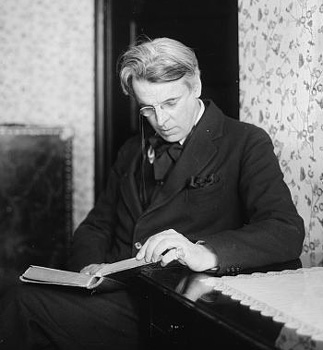Share This:
January 31, 2011 | Theatre,
A Tug-of-War Between Two Cultures

In addition, the Great Famine of the mid-1800’s coincided with high illiteracy rates, which remained widespread even into the twentieth century. This comes as little surprise: how could the Irish maintain reading mastery when they were literally starving? At this time the only types of literature produced were mainly translations of old Irish texts into English by supporters of the Irish Literary Revival. Often times, the conversion to English failed to capture the “Irishness” and lyrical syntax of the work. Despite their efforts to revive an interest in the forgotten stories of old Ireland, some critics say that these translations contributed to the decline of the language even more.
Then came William Butler Yeats. Although he was largely involved with the Irish  Literary Revival, Yeats did something very different from the “translators” of this time: he wrote his own material. Though still written in English, Yeats’ poetry was based on Irish themes and riddled with Anglicized Irish terms (also known as Hiberno-English). Yeats’ poetry aided in breaking the literary silence in Ireland. Then, along with Lady Gregory and John Millington Synge, Yeats helped form the Abbey Theatre in Dublin, providing yet another outlet for the voices of Ireland to be heard. It was there that many new Irish writers emerged, including Sean O’Casey and later Brien Friel and Tom Murphy.
Literary Revival, Yeats did something very different from the “translators” of this time: he wrote his own material. Though still written in English, Yeats’ poetry was based on Irish themes and riddled with Anglicized Irish terms (also known as Hiberno-English). Yeats’ poetry aided in breaking the literary silence in Ireland. Then, along with Lady Gregory and John Millington Synge, Yeats helped form the Abbey Theatre in Dublin, providing yet another outlet for the voices of Ireland to be heard. It was there that many new Irish writers emerged, including Sean O’Casey and later Brien Friel and Tom Murphy.
So the question is: why are many prominent Irish writers often portrayed as being British? Well, Ireland didn’t gain independence from the British Empire until  1922, so prior to this date the people of Ireland were considered “British.” Besides that, there are still the complexities of the battle over Northern Ireland, plus several well-known Irish literary authors, such as Richard Brinsley Sheridan and Oscar Wilde, did in fact spend a significant amount of time living in England. All of this, combined with the prejudice that the Irish language was inferior to English contributed to the Anglo-Irish duality in the literary world that is still often felt today.
1922, so prior to this date the people of Ireland were considered “British.” Besides that, there are still the complexities of the battle over Northern Ireland, plus several well-known Irish literary authors, such as Richard Brinsley Sheridan and Oscar Wilde, did in fact spend a significant amount of time living in England. All of this, combined with the prejudice that the Irish language was inferior to English contributed to the Anglo-Irish duality in the literary world that is still often felt today.
To get a taste of what’s happening with Irish literature in the 21st century, check out Irish Festival plays The Cripple of Inishmaan by Martin McDonagh and Terminus by Mark O’Rowe, plus our Irish Festival Readings (under the “Extras” tab), which include works by playwright Marina Carr, novelist/memoirist Hugo Hamilton, and novelist/journalist Peter Murphy.




Leave a Reply